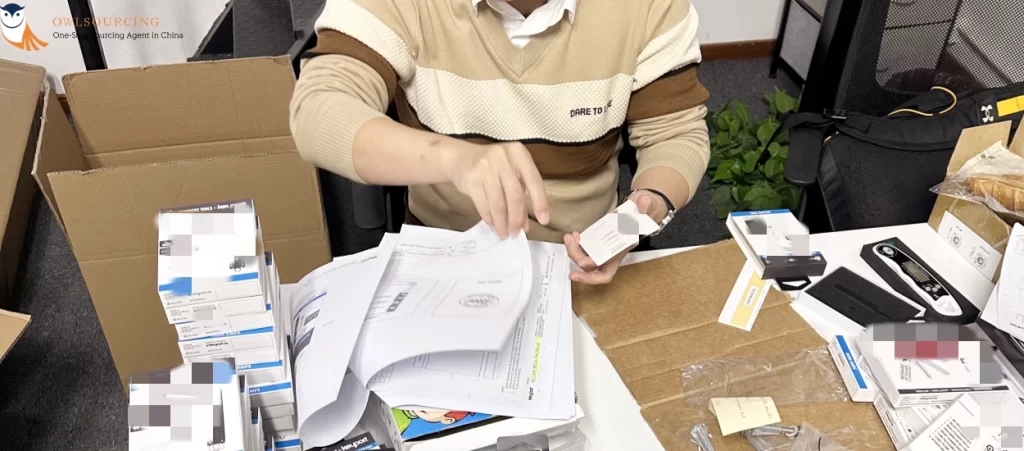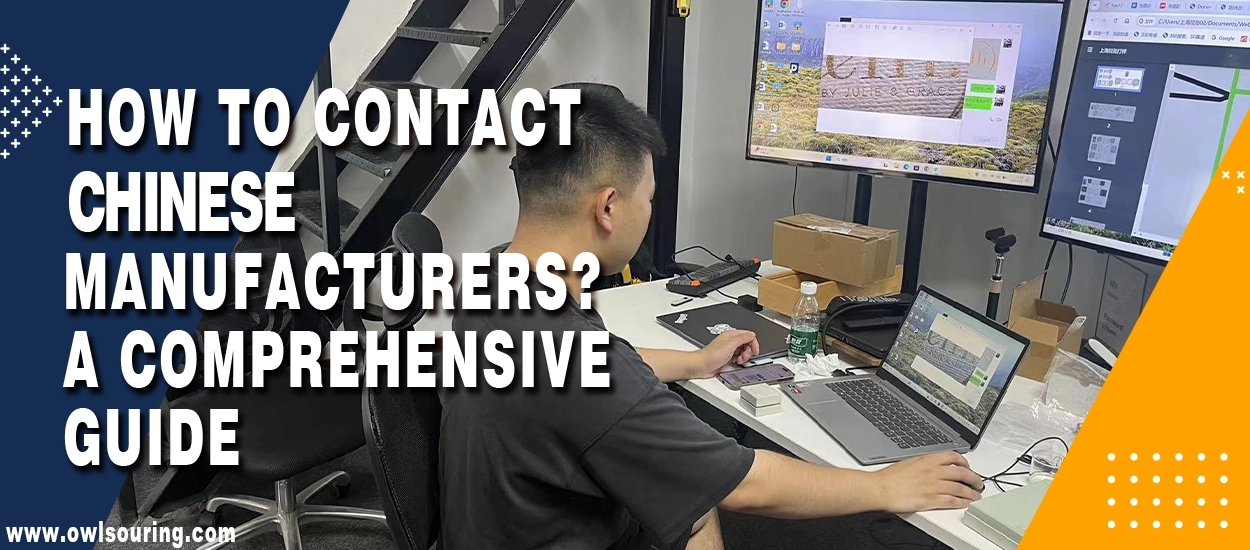Estimated reading time: 8 minutes
So here is the question – how to contact Chinese manufacturers? In case you are looking for Chinese manufacturers either on Alibaba or any other site of your choice, you are free to negotiate with them via these websites.
However, if you are not signing up for these platforms, you might consider implementing the following recommended methods as discussed in this article.
I’ve also written another article on finding trusted suppliers in China for more details.
Sourcing Methods for Finding Manufacturers in China
1. Online Platforms:
- B2B Marketplaces: Some of the Chinese B2B websites that bring together buyers and manufacturers are Alibaba, Global Sources, as well as Made-in-China. Such sites enable you to search for goods, reach their manufacturers and sellers, and evaluate costs.
- Other relatively new sites-including 1688.com, which is exclusively targeted to domestic Chinese buyers-are also used to source small volumes cheaply.
Begin Your Search on Alibaba.com
A. Filter by “Verified Manufacturers”
Alibaba.com is a great avenue to connect with Chinese manufacturers. It is a very good starting point for your sourcing journey.
Over the years, it has been a trusted platform that makes connecting with suppliers easy and building strong, profitable relationships.
Verifying supplier authenticity on Alibaba is essential. For a quick guide, check our article on finding company information on Alibaba.
B. Use Advanced Search Filters
The first time you are introduced to Alibaba’s enormous catalogue of products, it can be intimidating. To simplify this process, use their advanced filters to narrow your search and find a supplier that best suits your particular needs.
C. Search by Verified Manufacturer
The first thing to do is to focus on the verified manufacturers. The “Verified Manufacturers” filter means any supplier you look at has been independently verified to validate their claims about things like the size of their workforce or production capabilities, ultimately giving you confidence in their reliability.
D. Enable Trade Assurance for Protection
To protect your orders, select “Trade Assurance.” That includes financial protection if delivered goods don’t meet the standards agreed upon in your purchase order. That’s nice when you are working with a new supplier.
E. Consider Regional Specialisation
Each region in China is often known for specialising in particular types of products. By focusing on manufacturers located in regions frequently associated with your product category, you’re more likely to find experienced suppliers with the expertise to meet your needs.
F. Choose a Specialist Manufacturer
You will want to choose a manufacturer with experience producing your particular product. Specialisation brings about trust and ensures the supplier has the needed experience to provide quality, a factor that helps lay a foundation for success in a partnership.
2. Offline Methods:
-
Trade Shows: Trade fairs such as the Canton Fair or the Global Sources Expo enable one to visit manufacturers with the firms’ products, establish direct contact with the Chinese manufacturers, and negotiate business propositions.
-
Sourcing Agents: China sourcing agents are professionals who are capable of searching for suppliers, conducting negotiations, signing contracts, and performing other logistics services. Secondly, actual agents have a deep local knowledge and access to off-market suppliers.
-
Factory Visits: In-person factory audits give you a clear view of a manufacturer’s capabilities and quality. This is especially important for large or long-term projects, where manufacturing issues can have significant consequences.
-
Recommendations: It is always reliable to seek recommendations from friends and other contacts in your network who can recommend manufacturers that they know are professional. To get recommendations like these, one can use business networks or forums that focus on the specific industry.
Why Work with Owlsourcing?
 We connect you directly with factory-audited manufacturers—no middlemen, no uncertainty.
We connect you directly with factory-audited manufacturers—no middlemen, no uncertainty. Our team screens & verifies suppliers, manages samples, oversees production, and arranges shipping to your doorstep.
Our team screens & verifies suppliers, manages samples, oversees production, and arranges shipping to your doorstep. 100% transparent pricing—no hidden fees, customisation, or level of service.
100% transparent pricing—no hidden fees, customisation, or level of service. Assistance from beginning to end—from factory selection to shipping and logistics.
Assistance from beginning to end—from factory selection to shipping and logistics.
Purchasing in bulk from China needs more than a good website—you need in-the-trenches, hands-on experience. We’ve worked directly with Chinese factories for years and have a very good insight into what the importers experience.
Let’s get real:
Platforms like Alibaba, 1688, and DHgate are great to research on—but if you need true reliability, you need expert vetting and real-world support.
That’s what our Shanghai-based team does. From validating your suppliers to coordinating with shipping, we help you make it simple, save you from costly mistakes, and import with confidence.
 Looking to find the perfect China manufacturer? Let Owlsourcing help. Contact Us today.
Looking to find the perfect China manufacturer? Let Owlsourcing help. Contact Us today.
How to Contact Chinese Manufacturers Effectively?
Contacting Chinese manufacturers can be intimidating for some beginners, but there are effective ways to do it. Here are some tips:
1. Email: The Traditional Way

This is the most popular means of reaching Chinese manufacturers, and it involves the use of email. This is a conventional style of business writing as it grants the business a proper structure through which it communicates its needs.
When composing an email to a potential supplier, keep the following tips in mind:
-
Clear and Concise Language: Use simple, clear language. Do not use many connected, unrelated phrases or sentence structures that persons with poor English may not easily understand.
-
Detailed Information: Give as much information as possible about the requirements you wish your work partners to meet, the standards, the quantities, and the time frame. This puts the manufacturers in a position to understand your needs better.
-
Cultural Sensitivity: It is important to respect cultural diversity. For example, it is unheard of in Chinese business etiquette to write a business email without a courteous salutation and some casual conversation before getting to the main topic of discussion.
-
Follow-Up: In case you haven’t received a reply within a reasonable period, then you should follow up on the email. Once in a while, an email can be ignored or fall into the spam folder of the recipient’s inbox.
-
Professional Tone: The ideal nature of your conversation with any of the members of your intended audience should therefore remain professional at all times. This, in turn, assists in developing a polite and professional business relationship.
-
Contact Information: It is ok to include your contact information in the email signature. This should consist of your first and last name, your designation, your company’s name, telephone number, and any other means of contacting you, amongst other things.
-
Spam and Email Filters: Remember, your email may well go straight into the manufacturer’s spam box. To reduce this risk, it is strongly advised to limit the use of hyperlinks and avoid spammy-sounding subject lines.
2. WeChat

What Is WeChat? WeChat, also referred to as Weixin, is a social media and instant messaging app from Tencent in China. As it has over one billion unique active users monthly, it has become almost a necessity in people’s lives in China.
Here’s an overview of its key features and functions:
-
Messaging: Simply put, WeChat is an instant messaging app similar to WhatsApp, through which users can send text messages, record voice messages, and send videos and images. It allows for both instant messaging between the two individuals and group chat.
-
Mobile Payment: Perhaps the most valuable addition to WeChat is WeChat Pay, which is associated with the functionality of a payment system. It can be used for making a mobile payment, as well as sending money to friends; it is used in China for executing transactions between individuals and companies of various sizes, both in offline and online modes.
-
Video Calls and Conferencing: WeChat also offers voice and video calls, and group video calls for several individuals are possible to connect. This serves the purpose of social and business communications.
-
Privacy and Security: WeChat has end-to-end encrypted messaging; however, like any other online platform based in China, its messages can be obtained and monitored under certain legal procedures.
How to use WeChat to communicate with Chinese suppliers?
In the following section, I would like to introduce how WeChat can help improve your communications with Chinese suppliers in many ways. Here’s how you can leverage this platform effectively:
-
Create a WeChat Account: The first step would be to go to the WeChat application store and download the app, followed by registration. First, make sure you do not have any fake names on your profile while having a clear picture of yourself.
-
Connect with Suppliers: On WeChat, there are three ways to contact suppliers: invite the supplier by QR code, search the WeChat ID, or get the contact through Friends. Many of the exhibitions and business cards have a QR code for WeChat.
-
Initial Contact: When starting a new conversation with a supplier, make sure to state your name, company name, and reasons for communicating with him/ her professionally. One should be polite and to the point.
-
Share and Receive Information: Take screenshots or record videos of your requirements, or use a WeChat camera to record voice messages to simplify and make your demands clear, or to learn more about the supplier’s offering. This can be more efficient than emails, which can take hours and hours to write and to respond to.
-
Building Relationships: Chinese business culture values personal relationships. Engage in small talk and show interest in their culture to build rapport.
-
WeChat Groups: Another way of using WeChat for B2B marketing is by being a member or starting a WeChat group that deals with the industry in question, where people can market and share important information regarding new suppliers.
-
Document Sharing: When sharing contracts, more official documents, or specifics of a product to be developed, attach a file using the WeChat feature, but also send an email for documentation purposes.
-
Maintain Professionalism: Although WeChat is less business-like than email, you should be very formal and proper when talking to your clients.
Consider using WeChat to contact Chinese suppliers

- China’s most popular messaging app is WeChat
- Ease of Use
- Multimedia Communication
- Building Relationships
- Payment Convenience
WeChat had one billion monthly active users by 2016 and in 2019 the number had risen to over one billion. According to the data obtained to the beginning of the year 2022, WeChat has over 1.2 billion users.
WeChat payment started operating in 2013, the following year WeChat claimed to have registered 400 million users out of which 90% were Chinese.
WhatsApp and Facebook Messenger had approximately one billion MAU in 2016 and, while they are often compared to WeChat, they could not provide most of the other services.
For instance, while social media advertising realization in the quarter ending June 2017 in WeChat was about 0.9 Billion US Dollar (RMB 6 Billion), Facebook overall figures were about 9.3 Billion US Dollar that was driven by about 98% of social media advertising only.
Value-added service was the chief source of WeChat’s revenues, realizing 5.5 billion US dollars.
From:Wikipedia
You can choose the WeChat download method here: Download WeChat
Note: When one is seeking services through WeChat or directly with sourcing agents in China, there is a risk of being misled into undesirable situations.
While the tools and services might be effective for communication and procurement, they also carry a certain level of risk, which should be addressed proactively.
3. VooV Meeting (Tencent Meetings)

Sometimes, face-to-face interaction is necessary to contact Chinese manufacturers. This is where VooV Meeting (Tencent Meetings) steps in – an enterprise-level video conferencing software that comes from Tencent. Here are reasons it can facilitate effective communication:
- Widespread Use in China: China is home to Tencent Meetings, which makes it entrepreneurially established, and most Chinese manufacturers have experience with it.
- Cost-Effective: The technology provides an efficient means of real-time physical meetings without having to traverse international borders.
- Real-Time Communication: It can include voice and video chat, which may be much more efficient than regular e-mail or Instant Messaging when it comes to product and service details, for instance.
- Visual Demonstrations: Screen and video calls can be convenient in presenting the product, designs, manufacturing process, etc., which can be very useful if quality control and checks are needed.
- Document Sharing: Tencent Meetings has the option of sharing documents within the meeting so that attendees can review and discuss during the meeting, as it is much faster than email exchanges.
- Meeting Recording: It is possible to record meetings with a view to providing easy referencing to ensure that details, as presented in the meetings, are not lost and can be relayed to other members of the team who did not attend the meeting.
- Security and Privacy: This is crucial in a business setting when business information to be discussed is sensitive in Tencent Meetings.
| Communication Method | Pros | Cons |
| Formal and professional, clear record keeping, suitable for attachments and detailed documentation | Slower response times, potential language barriers, and the risk of emails going to spam | |
| Widely used in China, instant communication supports multimedia communication | Informality, potential data security issues, and require account setup | |
| VooV Meeting | Effective for detailed discussions, real-time interaction, and video capabilities | Time zone coordination, technical requirements, and potential language barriers in real-time |
4. China sourcing agent

Owlsourcing has a deep understanding of the Chinese market and maintains long-term contacts with manufacturers there.
Owlsourcing focuses on product quality inspection, negotiation strategies, and identifying potential risks in the procurement process.
From finding a manufacturer in China to connecting with them, from quality checks to shipping your product directly from China, Owlsourcing also offers after-sales support, providing comprehensive services for your international sourcing business.
How to Contact Suppliers in China?
It is quite similar to contacting Chinese manufacturers. In summary:
| Method | Details |
|---|---|
| Online Platforms | Use platforms like Alibaba, Made-in-China, and 1688 to search for suppliers and contact them directly. |
| Initiate contact using the business email addresses listed on supplier profiles for formal communication. | |
| Connect with suppliers via WeChat for quicker, more direct communication and relationship building. | |
| Trade Shows | Attend events like the Canton Fair to meet multiple suppliers face-to-face and discuss your requirements. |
| Sourcing Agents | Work with experienced sourcing agents to find reliable suppliers and navigate the process efficiently. |
communication challenges when contacting Chinese manufacturers

While effective communication is crucial for successful business relationships, there are some common challenges you may encounter when dealing with Chinese manufacturers:
1. Language Barriers
Language differences can pose significant hurdles during communication. Many Chinese suppliers have varying levels of proficiency in English, so it’s essential to keep language barriers in mind and efforts to be clear are required.
2. Cultural Differences
Cultural nuances play a role in business interactions as well. Understanding and respecting cultural differences can help avoid misunderstandings and foster stronger relationships.
3. Negotiation Styles
Different suppliers have different characteristics. In our sourcing work, we have encountered some Chinese manufacturers who are unwilling to accept others’ opinions about their products. They always think they are right, but in fact, their ideas are not what we want. Yet, they still refuse to communicate.
4. Indirect Communication

In China, a large proportion of Chinese manufacturers are more accustomed to using ambiguous statements in communication, making it difficult for you to guess their thoughts during interactions, and they do not express their opinions and views directly.
Read More:
- What is a Sourcing Agent?
- How to Source Products From China?
- Benefits of Working with China Sourcing Agents
- How to Find a Reliable Manufacturer in China?
Final Thoughts
Contacting Chinese manufacturers may not be an easy task. I hope you can get some help after reading this article. Please remember that it’s important to be well-prepared before contacting Chinese suppliers and to choose the most appropriate method of communication.
If you have any further questions, please feel free to contact us.



4 thoughts on “How to Contact Chinese Manufacturers?”
Can you recommend a manufacturer who specializes in producing sustainable clothing for a small startup fashion brand?
Of course, Nicole,😊
please contact us and we will provide you with a complete list of manufacturers and considerations.
Can you suggest a manufacturer that specializes in producing high-quality and durable reusable water bottles for a new eco-friendly brand? I am based in the US and would prefer a company that uses sustainable materials and production methods.
No problem, Michael.
Owlsourcing has been working in procurement in China for over a decade and has established good relationships with numerous manufacturers.
Please send an email to Info@localhost, and I think we can discuss in detail about your requirements.
Andy